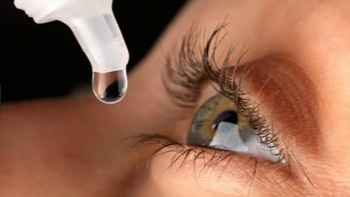 HYLO eye drops by CandorVision have revolutionized the way we use eye drops. For decades, eye drops have always been stuffed into the same dropper bottles that all have the same problems:
HYLO eye drops by CandorVision have revolutionized the way we use eye drops. For decades, eye drops have always been stuffed into the same dropper bottles that all have the same problems:
- Once opened, they are prone to contamination
- They force the eye drop formulations to contain preservatives
- It is difficult to control the volume of drops
- It is difficult to squeeze for those with finger strength/dexterity issues
In contrast to conventional eye drops, HYLO eye drops are:
- Preservative free
- Contained in sophisticated multi-use bottles that keep the contents sterile
- Perfectly control the number and size of every eye drop
- Easier to grip and squeeze
Let’s explore the advantages of HYLO eye drops a little more in depth.
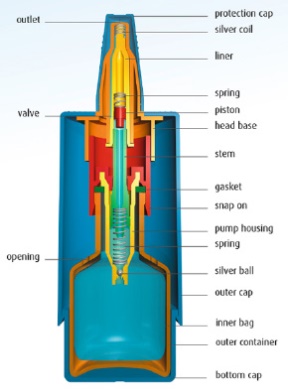
The Contamination Problem
One of the biggest issues with traditional eye drop bottles is that once they are open, bacteria and other contaminants can enter the bottle and contaminate your eye drops.
That’s why every eye drop formulation placed in a traditional eye drop bottle has to have preservatives inside it. These preservatives can cause damage to your eyes in the long run, especially if you wear contact lenses (because the preservatives accumulate inside the contact lenses themselves).
This is especially true if the proper technique is not performed when using traditional eye drop bottles. If you allow the tip of the bottle to touch your eyelids, eyelashes, or fingers, you’re almost sure to transfer some bacteria or virus onto your eye drop bottle. Once on the bottle, there’s nothing that prevents these viruses or bacteria to enter the bottle and get into your eye drops.
One study on 26 patients with adenovirus conjunctivitis using eye drops found that 73% of eye drops tested positive for adenovirus, with some bottles staying positive for up to 9 weeks after removal from the patient.
– American Journal of Ophthalmology
The patented HYLO eye drop bottle revolutionizes the way eye drops are delivered to the eye. The bottle has an internal airless application system. This completely prevents the contents of the bottle from being exposed to the external environment, hence completely prevents the possibility of contamination.
The Delivery Problem
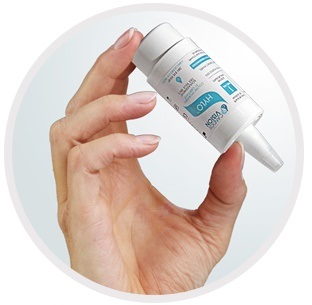
With traditional eye drop bottles, the amount of eye drops dispensed depends on how hard and how long you squeeze the bottle. As a results, a lot of people end up expelling 3-4 drops out of the bottle resulting in a lot of waste, and wet mess on your face.
The unique design of HYLO eye drop bottles results in a single drop getting delivered every time. Instead of squeezing the bottle sideways like you would a traditional eye drop bottle, you compress the bottle vertically by a pre-set amount. The bottle is designed to deliver a single drop per compression. No waste, no mess.
The Difficulty of Use Problem
Traditional eye drop bottles are typically small, and can be very difficult to squeeze, especially for those with weakness in their hands such as children, the elderly, people with arthritis, carpel tunnel syndrome, etc.
Larger (10mL) bottles are taller, and therefore a little easier to squeeze, but these are much more prone to contamination (because they take a lot longer to use up) and can lead to waste if you can’t finish the bottle before its expiry date.
HYLO solves both of these issues with its ingeniously designed bottle. The bottles are easy to compress, even by those with reduced finger strength and dexterity.

Additionally, the carefully calibrated pump system always dispenses the same amount of drops, so you don’t have to worry about getting too much or not enough into your eyes.
Who are HYLO Eye Drops For?
Anybody can use HYLO eye drops, but they will be especially beneficial to those with sensitive dry eyes, and contact lens wearers.
For people with dry eyes
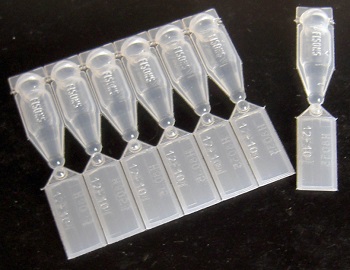
People who suffer from dry eyes have a very fragile tear film protecting their eyes. That means that their eyes are very sensitive to any irritant, including the preservatives in traditional eye drops. That’s why when you are prescribed normal eye drops, you are instructed not use them more than 4-6 times per day.
Before HYLO eye drops, if your dry eye was severe enough to require you to use eye drops every hour or so, you had to purchase preservative free eye drops packaged into little individual use droppers called minims. These single use plastic droppers are costly and wasteful.
HYLO allows you to receive the benefits of preservative free eye drops from the same bottle every single time.
For people with contact lenses
Contact lenses are notorious for their ability to absorb and retain water. Unfortunately, they also absorb and retain anything found in that water, including preservatives from eye drops. This allows those preservatives to accumulate and concentrate within the contact lenses, which then leads to eye irritation with contact lenses.
HYLO is the perfect eye drop to solve this problem because it doesn’t contain any preservatives to begin with. Click here for more information on HYLO and contact lenses.
5 Types of HYLO Eye Drops
CandorVision makes 5 different formulations of eye drops to accommodate as many different needs as possible. They are:
HYLO
|
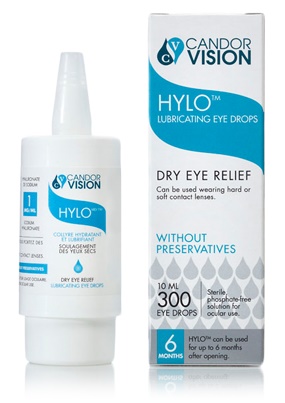 |
HYLO DUAL
|
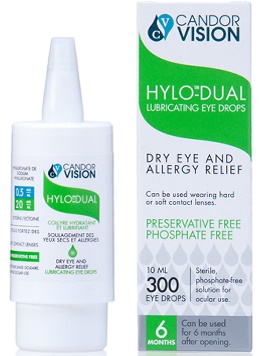 |
HYLO GEL
|
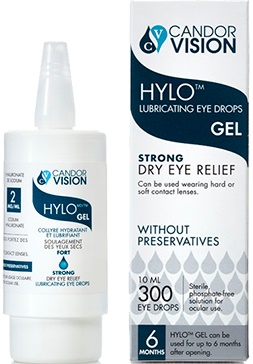 |
OCUNOX ointment
|
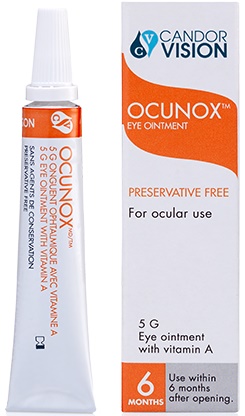 |
CALMO EYE SPRAY
|
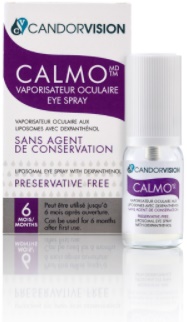 |
Where to Buy HYLO Eye Drops
HYLO eye drops are relatively new to the North American market compared to brands like Systane, Refresh, Blink, Visine etc. They are increasingly being made available in doctors offices, but still difficult to find in some pharmacies and online.
As of writing this article, here are places where HYLO eye drops are available online:
| $29.90 | |
| not available | |
| not available | |
| not available | |
| not available |
Share Your Experience
Have you tried HYLO eye drops? If so, please share your experience with it in the comments below!

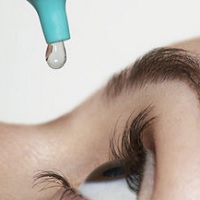


3 Responses
Mabel
I have been using HYLO Gel for the last three months, like it much. It is supposed to b good for 6 months use, with about 300 drops, however, I have great difficulty in pumping the gel out of the bottle, I can hear liquid moving inside the bottle, but cannot get it out. Quite frustrating as it is expensive.
Julie
Hi Mabel, I have had a similar experience with this bottle sometimes myself. When the bottle is almost empty, it tends to spit and bubble small amounts instead of dispensing a nice full drop.
Nieves
This is one of the most difficult eye drop containers that I have used. How the design was approved I cannot understand. I do not have large hands and maybe that could be the problem, but the plunger is too stiff, so once it does go down, often the container moves direction, and drop goes anywhere but in the eye. Terrible applicator.